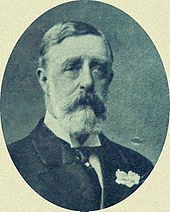Edward Goschen
Sir William Edward Goschen, 1st Baronet GCB GCMG GCVO PC (born July 18, 1847 in Eltham , now part of London , England, † May 20, 1924 in London) was a British diplomat of German descent.
Life
Edward Goschen was one of the sons of the Saxon businessman Wilhelm Heinrich Göschen (William Henry Goschen), the younger brother of the Tory politician George Joachim Goschen, 1st Viscount Goschen and grandson of the Saxon publisher Georg Joachim Göschen . Goschen attended rugby school and studied at Oxford University , for which he competed in cricket as a right-handed batsman in five first-class games . In 1869 Goschen joined the British Foreign Service. From 1905 to 1908 he acted as British ambassador in Vienna , then as the successor to Sir Edward Malet , from 1908 to 1914, until the outbreak of World War I , as British ambassador in Berlin . Goschen is still remembered today mainly in connection with his conversation with the German Chancellor Theobald von Bethmann Hollweg on August 4, 1914, in which the Chancellor's famous request was made to Goschen that the United Kingdom should not be allowed "because of a scrap of paper" (meant was Great Britain's declaration of guarantee for the sovereignty of Belgium) to enter the war. In Great Britain these words were taken for decades as evidence of German barbarism and militarist sentiments and thus made Goschen, as their narrator, famous as a key witness of the “Hunnish lack of culture”.
From 1905 Goschen was a member of the Privy Council of the British Crown. On January 17, 1916 he was given the hereditary title of Baronet , of Beacon Lodge in the Parish of Highcliffe in the County of Southampton . When he died in Chelsea , London, in 1924 , his son Edward Henry Goschen inherited his title of nobility.
Highcliffe has been part of Christchurch since 1932 , which in turn has been part of Dorset since 1974 . One of his possessions in Austria was Tentschach Castle , which he inherited from Oskar Göschen in 1900 . In the summer of 1905 and 1906, King Edward VII of England was visiting for a few days. Sir Goschen had a bathing establishment with a water pipe system built in Tentschach . During the First World War , the castle was classified as enemy property and confiscated. A Red Cross lung sanatorium was set up in the castle . After the war, the Goschen family got their property back. The estate was sold in the second half of the 20th century.
Web links
- Newspaper article about Edward Goschen in the 20th century press kit of the ZBW - Leibniz Information Center for Economics .
Individual evidence
- ^ Helmut Hiller: Göschen, Georg Joachim. In: New German Biography (NDB). Volume 6, Duncker & Humblot, Berlin 1964, ISBN 3-428-00187-7 , p. 542 ( digitized version ).
- ↑ From diplomacy. In: Wiener Salonblatt , August 22, 1908, p. 13 (online at ANNO ).
- ^ Court and Society. In: Sport & Salon , November 11, 1905, p. (Right) (online at ANNO ).
- ^ Tentschach near Klagenfurt. In: Kärntner Zeitung / Kärntner Tagblatt , March 11, 1910, p. (Bottom center) (Online at ANNO ).
- ↑ Small coincidences in the great war. In: Österreichische Volks-Zeitung / Kleine Volks-Zeitung / Volks-Zeitung , September 8, 1916, p. (3rd column, middle) (online at ANNO ).
- ↑ tuberculosis sanatorium in the castle Tentschach, 1913. Austria Press Agency Picturdesk, accessed on 21 March 2020 .
- ↑ Wehbauten in Austria. Tentschach Castle. Hermann Truschnig wehrbauten.at, accessed on March 21, 2020 .
| personal data | |
|---|---|
| SURNAME | Goschen, Edward |
| ALTERNATIVE NAMES | Goschen, Sir Edward, 1st Baronet; Goschen, William Edward; Göschen, Wilhelm Eduard |
| BRIEF DESCRIPTION | British diplomat |
| DATE OF BIRTH | July 18, 1847 |
| PLACE OF BIRTH | Eltham (London) |
| DATE OF DEATH | May 20, 1924 |
| Place of death | London |
